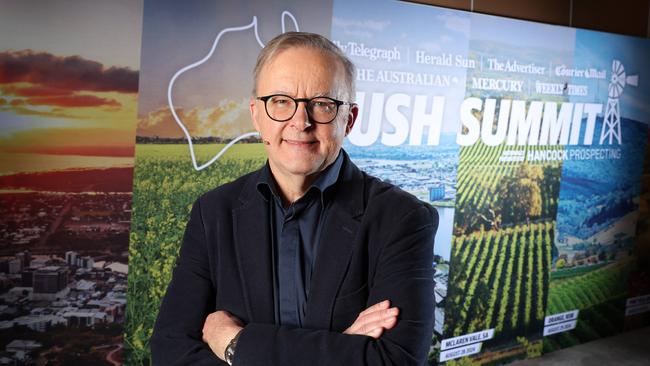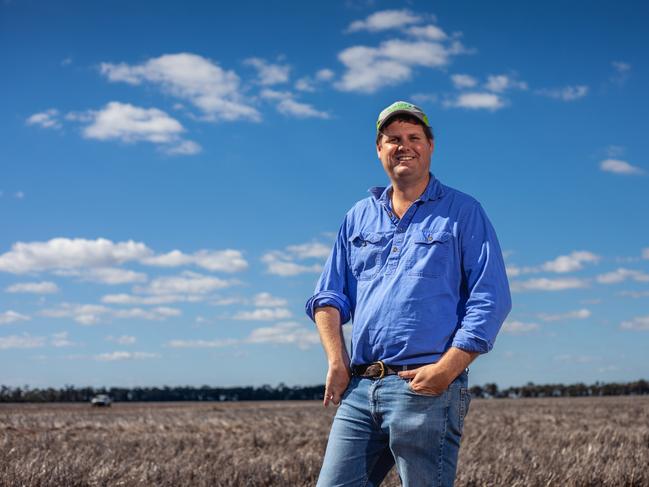Bush Summit: Farmers are loved, they just don’t know it, survey finds
Farmers feel like the work they do is under-appreciated by the general public. Three quarters of everyday Australians agree.

Years of sustained pressure from governments and activists to reform the way they go about their work has left Australian farmers feeling undervalued by the public, but new research shows primary producers have more community support than they believe.
Contrasting surveys released this week highlighted the difference between perception and reality when it comes to public sentiment towards the agriculture sector.
A new survey of 1003 everyday Australians, conducted by research firm Dynata for the Institute of Public Affairs, found that 74 per cent agreed primary producers and miners were underappreciated.
Meanwhile, a National Farmers’ Federation survey of 1026 producers released on Wednesday found that only 24.9 per cent of farmers believed their work was valued by the Australian public, down 17 per cent from last year.
That was despite an overwhelming number of farmers saying they love what they do (88.7 per cent) and the communities they live in (77.6 per cent).
Grain and cotton grower Nigel Corish, who farms in Queensland’s Western Downs, said government policies targeting agriculture, as well as activists with amplified social media platforms, had contributed to farmers believing they were not appreciated by everyday Australians.
“Unfortunately, the activists have got a really strong voice on social media and … farmers really feel these activists are representing a much broader part of the population,” Mr Corish said.
“Farmers lose confidence, particularly when they put a lot of energy and work into growing such good crops for food and fibre, and they feel so disheartened.”
Mr Corish, who with his wife Vanessa was dubbed The Weekly Times Farmer of the Year, said farmers’ sense of being underappreciated had been exacerbated by a growing disconnect between rural and urban communities.

He said it was incumbent on the agriculture industry to better convey the work farmers do and the sustainable methods they use.
“We’re very insular in agriculture and we’re very good at talking to ourselves about how good we are but I think the broader public are unaware of all the good things we are doing,” he said.
NFF president David Jochinke said anti-farming rhetoric had been fuelled by activists and politicians. “Besides the trolling and misinformation being spread online, activist organisations are pumping millions into anti-farming campaigns and their political influence is growing,” he said.
“Farmers are also constantly having to fight to make sure government policy isn’t going to harm their ability to grow food and fibre, and when government ploughs ahead anyway, farmers are hit with the narrative ‘it’s what voters want’.
“It’s no wonder that farmers feel the public don’t value them when the country’s leaders and the activist organisations don’t listen to them, or purport fake or exaggerated information with the intent to shut down farms.”
Mr Jochinke said rural communities often felt left behind by policies that prioritise urban interests.
Issues facing rural Australia were brought to the fore on Friday at the first of News Corp’s Bush Summits, held in Townsville, where Anthony Albanese spoke of the importance of the agriculture and mining industries.
But his government has been under attack from farmers over plans to shut down the live sheep export trade, a shelved biosecurity levy and water buybacks in the Murray-Darling Basin.
The IPA survey also found that most respondents did not believe farming had a negative impact on the environment, with 41 per cent saying it had a “positive or highly positive” impact, 31 per cent “neutral” and 18 per cent “negative or highly negative”.
It also found a perception that decision makers in Canberra did not understand the needs of regional Australians, with 26 per cent saying politicians and public servants understood the bush, while 44 per cent said they did not and 30 per cent were neutral.
Respondents to the IPA survey were also generally not opposed to a Coalition proposal to create a new special economic zone with lower taxes to stimulate growth in northern Australia.
Only 15 per cent opposed the idea, while 42 per cent said they were in favour.




To join the conversation, please log in. Don't have an account? Register
Join the conversation, you are commenting as Logout